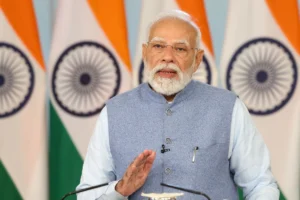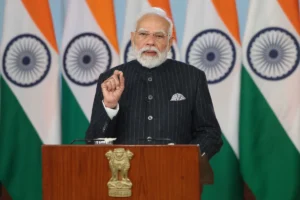
In a world grappling with climate challenges, India has set a remarkable example by reaching its target of 50% installed power capacity from non-fossil fuel sources, five years ahead of schedule.
This accomplishment reaffirms India’s commitment to global climate goals and showcases its leadership in the clean energy transition.
Prime Minister Narendra Modi’s proactive approach and vision have driven the nation’s steady progress toward a sustainable and self-reliant energy future.
Taking to X, Union Minister Pralhad Joshi posted, “In a world seeking climate solutions, India is showing the way. Achieving 50% non-fossil fuel capacity five years ahead of the 2030 target is a proud moment for every Indian. Hon’ble PM Shri @narendramodi ji’s leadership continues to drive Bharat’s green transformation — paving the path towards a self-reliant and sustainable future.”
In a world seeking climate solutions, India is showing the way.
Achieving 50% non-fossil fuel capacity five years ahead of the 2030 target is a proud moment for every Indian.
Hon’ble PM Shri @narendramodi ji’s leadership continues to drive Bharat’s green transformation — paving… pic.twitter.com/ydzWErWQNC
— Pralhad Joshi (@JoshiPralhad) July 14, 2025
The country’s installed capacity now includes over 230 GW from renewable and non-fossil fuel sources such as solar, wind, hydro, and nuclear power, positioning India among the top global leaders in clean energy.
Net-Zero Emissions by 2070
Policymakers enabled the transition through major initiatives such as the International Solar Alliance, the National Green Hydrogen Mission, and the expansion of solar and wind infrastructure under flagship schemes like PM-KUSUM and the Solar Park Scheme.
Growing domestic manufacturing in clean tech and active private sector participation have supported these efforts.
Experts noted that this early success sends a strong message globally, particularly to developing nations seeking to balance economic growth with environmental responsibility.
India’s journey reflects how determined leadership, innovation, and inclusive policies can drive large-scale transformation.
Looking ahead, the government remains focused on achieving net-zero emissions by 2070.
India’s early fulfilment of the interim goal actively accelerates future sustainability initiatives, including decarbonising transport, urban development, and industry.
India’s achievement is not only a triumph for national policy but also a critical contribution to the global climate movement.
As the world continues to search for practical climate solutions, India is already showing the way.
Also Read: ‘Inspired A Billion Dreams’: PM Modi Hails Shubhanshu Shukla’s Return From Space
To read more such news, download Bharat Express news apps


















